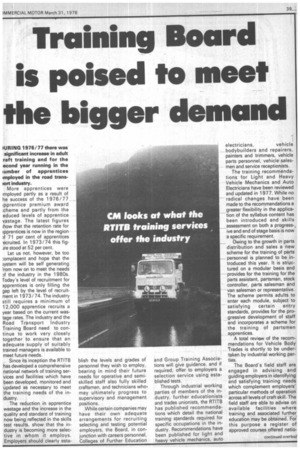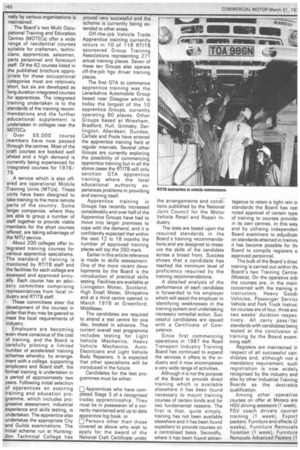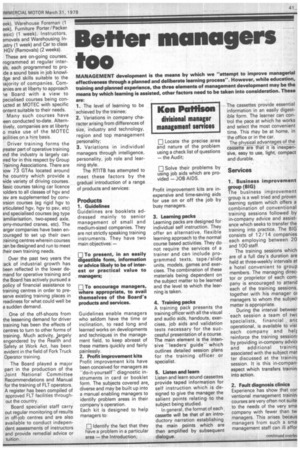Training Board is poised to meet the bigger demand
Page 31

Page 32

Page 33

If you've noticed an error in this article please click here to report it so we can fix it.
WRING 1976/77 there was significant increase in adult raft training and for the econd year running in the lumber of apprentices imployed in the road transKin industry.
More apprentices were .mployed partly as a result of he success of the 1976/77 ipprentice premium award ,cheme and partly from the educed levels of apprentice vastage. The latest figures ,how that the retention rate for ipprentices is now in the region )f 71 per cent of apprentices • ecruited. In 1973/74 this figire stood at 52 per cent.
Let us not, however, be too .:omplacent and hope that the system will be self generating 'rpm now on to meet the needs 3f the industry in the 1980s. Today's level of recruitment for apprentices is only filling the gap left by the level of recruitment in 1973/74. The industry still requires a minimum of 12,000 apprentice recruits a year based on the current wastage rates. The industry and the Road Transport Industry Training Board need to continue to work very closely together to ensure that an adequate supply of suitably trained managers is available to meet future needs.
Since its inception the RTITB has developed a comprehensive national network of training services and facilities which have been developed, monitored and updated as necessary to meet the training needs of the industry.
The reduction in apprentice wastage and the increase in the quality and standard of training now being reflected in the skills test results, show that the industry is becoming more selective in whom it employs. Employers should clearly esta blish the levels and grades of personnel they wish to employ, bearing in mind their future needs for operative and semiskilled staff also fully skilled craftsmen, and technicians who. may ultimately progress to supervisory and management positions.
While certain companies may have their own adequate arrangements for recruiting selecting and testing potential employers, the Board, in conjunction with careers personnel, Colleges of Further Education
and Group Training Associations will give guidance, and if required, offer to employers a selection service using established tests.
Through industrial working parties of members of the industry, further educationists and trades unionists, the RTITB has published recommendations which detail the national training standards required for specific occupations in the industry. Recommendations have been published for light and heavy vehicle mechanics, auto electricians, vehicle bodybuilders and repairers, painters and trimmers, vehicle parts personnel, vehicle salesmen and service receptionists.
The training recommendations for Light and Heavy Vehicle Mechanics and Auto Electricians have been reviewed and updated in 1977. While no radical changes have been made to the recommendations a greater flexibility in the applica tion of the syllabus content has been introduced and skills _assessment on both a progress-, ive and end of stage basis is now a specific requirement.
Owing to the growth in parts distribution and sales a new scheme for the training of parts
personnel is planned to be introduced this year. It is struc
tured on a modular basis and
--provides for the training for the parts assistant, partsman, stock ' controller, parts salesman and -van salesman or representative. The scheme permits adults to
enter each module, subject to satisfying certain entry standards, provides for the pro gressive development of staff and incorporates a scheme for the training of partsmen apprentices.
A total review of the recommendations for Vehicle Body Trades is shortly to be undertaken by by industrial working parties.
Board's field staff are engaged in advising and guiding employers in identifying and satisfying training needs which complement employers' particular methods of operation across all levels of craft skill. The field staff are able to advise on available facilities where training and associated further education may be obtained. For this purpose a register of approved courses offered natio
nally by various organisations is maintained.
The Board's two Multi Occupational Training and Education Centres (MOTECs) offer a wide range of residential courses suitable for craftsmen, technicians, apprentices, salesmen, parts personnel and forecourt staff. Of the 82 courses listed in the published brochure appropriate for these occupational categories most are relatively short, but six are developed as long duration integrated courses for apprentices. The integrated training undertaken is to the standards of the training recommendations and the further educational supplement is undertaken in colleges near the MOTECs.
Over 55,000 course members have now passed through the centres. Most of the ,craft courses are booked well ahead and a high demand is currently being experienced for integrated courses for 1978/ 79.
A service which is also offered are operational Mobile 'Training Units (MTUs). These units have been designed to take training to the more remote parts of the country. Some larger companies, where they are able to group a number of staff together to provide viable members for the short courses offered, are taking advantage of the MTU service.
About 200 colleges offer integrated training courses for various apprentice specialisms. The standard of training is monitored by RTITB staff and the facilities for each college are assessed and approved annually. Each course has an advi.sory committee comprising representatives from local industry and RTITB staff.
These committees steer the development of the courses in order that they may be geared to meet the local requirements of industry.
Employers are becoming even more conscious of the cost of training, and the Board is carefully piloting a limited number of accelerated training schemes whereby, by arrangement with a college, supporting employers and Board staff, the formal training is undertaken in a period of approximately two years. Following initial selection of apprentices an exacting training and education programme, which includes progressive assessment, industrial experience and skills testing, is undertaken. The apprentice also undertakes the appropriate City and Guilds examinations. The initial scheme run at Huntingdon Technical College has proved very successful and the scheme is currently being extended-to other areas.
Off-the-job Vehicle Trade Apprentice training currently occurs in 10 of 118 RTITB sponsored Group Training Associations representing 271 actual training places. Seven of these ten Groups also operate off-the-job hgv driver training places.
The first GTA to commence apprentice training was the Lanarkshire Automobile Group based near Glasgow which. is today the largest of the 10 apprentice Groups, currently operating 80 places. Other Groups based at Wrexham, Bradford, Hull, Grimsby, Darlington, Aberdeen, Dundee, Carlisle and Poole have entered the apprentice training field at regular intervals. Several other Groups are currently exploring the possibility of commencing apprentice training but in all the above cases the RTITB will only sanction GTA apprentice training where the local educational authority experiences problems in providing and training itself.
Apprentice training in Groups has recently increased considerably and over half of the Apprentice Groups have had to move into larger premises to cope with the demand, and it is confidently expected that within the next 12 to 18 months the number of approved training places will top the 350 mark.
Earlier in this article reference is made to skills assessment. One of the more recent developments by the Board is the introduction of practical skills testing. Facilities are available at Livingston Motec, Scotland, High Ercall Motec, Shropshire and at a third centre opened in March 1978 at Greenford, Middlesex.
The candidates are required to attend a test centre for one day, booked in advance. The current overall test programme includes testing for Light Vehicle Mechanics, Heavy Vehicle Mechanics, AutoElectricians and Light Vehicle Body Repairers. It is expected that other specialisms will be introduced in the future.
Candidates for the test programmes must be either: [1] Apprentices who have completed Stage 3 of a recognised trades apprenticeship. They must be in possession of a correctly maintained and up to date apprentice log book, or
El Persons other than those covered as above who wish to apply for the award of the National Craft Certificate under the arrangements and conditions published by the National Joint Council for the Motor Vehicle Retail and Repair Industry.
The tests are based upon the required standards in the Board's training recommendations and are designed to measure the skills of the candidate across a broad front. Success shows that a candidate has reached the minimum level of proficiency required by the training recommendations.
A detailed analysis of the performance of each candidate is forwarded to his employer which will assist the employer in identifying weaknesses in the training system and undertaking necessary remedial action. Successful candidates are issued with a Certificate of Competence Since first commencing operations in 1967 the Road Transport Industry Training Board has continued to expand the services it offers to the industry and it now encompasses a very wide range of activities.
Although it is not the purpose of the Board to provide direct training which is available elsewhere it has been found necessary to mount training courses of certain kinds and for two fundamental reasons. The first is that, quite simply, training has not been available elsewhereand it has been found expedient to provide courses on a centralised basis. Secondly, where it has been found advan
tageous to retain a tight rein o standards the Board has rest ricted approval of certain type of training to courses provide in its own centres. In this way and by utilising independen Board examiners to adjudicati on standards attained in trainini it has become possible for tre Board to compile registers o approved personnel.
The bulk of the Board's direc training is carried out within thi Board's two Training Centre: (Motecs). On the operative sidi the courses are, in the main concerned with the training o instructors. Heavy Good: Vehicles, Passenger Servict Vehicle and Fork Truck Instruc tor courses are of four, three anc two weeks' duration respec tively. All carry pass /fai standards with candidates beinc tested at the conclusion ol training by the Board examining staff.
Registers are maintained ir respect of all successful candidates and, although not a mandatory requirement, such registration is now widely recognised by the industry and also by other Industrial Training Boards as the desirable qualification. Among other operative courses on offer at Motecs are HGV driving assessors (1 week), PSV coach drivers courier training (1 week), Export
packers. Furniture and effects (2 weeks), Furniture Removals Foreman (1 week), Furniture Removals Advanced Packers (1
eek), Warehouse Foreman (1 eek), Furniture Porter/Packer. lasic) (1 week), instructors, emovals and Warehousing InJstry (1 week) and Car to class HGV (Removals) (2 weeks).
These are on-going courses; rogrammed at regular inter31s, each programmed to proide a sound basis in job knowlclge and skills suitable to the lajority of companies. Cornanies are at liberty to approach le Board with a view to pecialised courses being conucted at MOTEC with specific ontent suitable to their needs.
Many such courses have ieen conducted to-date. Alterntively, companies are at liberty o make use of the MOTEC acilities on a hire basis.
Driver training forms the greater part of operative training ind the industry is largely catred for in this respect by Group fraining Associations. There are Iow 73 GTAs located around he country which provide a vide variety of driving courses. 3asic courses taking car licence -iolders to all classes of hgv and )5v are supplemented by conyarsion courses (eg rigid hgv to articulated hgv, hgv to psv, etc) and specialised courses (eg type lamiliarisation, two-speed axle, orry-mounted cranes, etc). The arger companies have been en3ouraged to set up their own :raining centres wherein courses an be designed and run to meet their own training needs.
Over the past two years the lack of industrial growth has been reflected in the lower demand for operative training and the Board has actively pursued a policy of financial assistance to training centres in order to preserve existing training places in readiness for what could well be a sudden demand.
One of the off-shoots from the lessening demand for driver training has been the effects of centres to turn to other forms of training. Much activity, largely engendered by the Rea1th and Safety at Work Act, has been evident in the field of Fork Truck Operator training.
The Board played a major part in the production of the Joint National Committee Recommendations and Manual for the training of FLT operators. A register has been compiled of approved FLT facilities throughout the country.
Board specialist staff carry out regular monitoring of results in off-job centres and are also available to conduct independent assessments of instructors and provide remedial advice or tuition.






















































































































